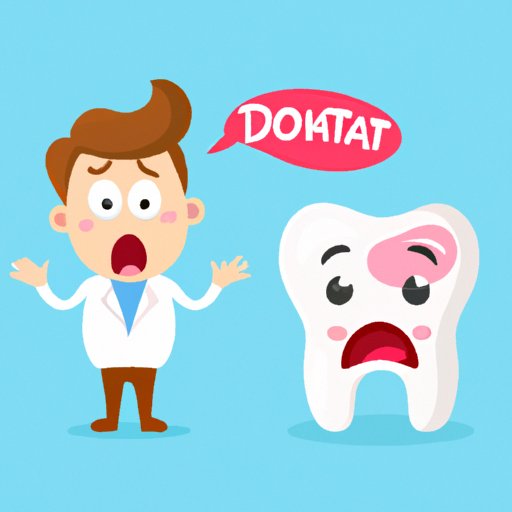
Introduction
Expecting mothers have a lot on their plate already, and the thought of adding dental appointments to the mix may be daunting. However, maintaining good dental health during pregnancy is key not just for the mother’s wellbeing, but also for the baby’s. This article aims to clear up misconceptions and provide information on dental care during pregnancy.
The Truth About Visiting the Dentist When Pregnant
Many pregnant women may be concerned about the safety of dental treatments and procedures during pregnancy. However, the American Dental Association and the American Congress of Obstetricians and Gynecologists agree that it is safe to visit the dentist and receive dental treatment during pregnancy.
It is important to let the dentist know about the pregnancy and any related health concerns. Anesthesia can be used during dental procedures if necessary, but may be limited during the first trimester if possible. X-rays can also be taken if necessary, but the abdomen will be protected with a lead apron to minimize exposure to the baby. Non-emergency dental procedures may also be postponed until after delivery.
Good dental health is especially important during pregnancy due to the changes in hormone levels. Poor dental health has also been linked to premature births and low birth weights. Therefore, prioritizing dental care during pregnancy is important not just for the mother’s wellbeing, but also for the baby’s.
What Every Expecting Mother Should Know About Dental Health
Dental health can also be affected by hormonal changes during pregnancy. Pregnant women may experience gum inflammation and bleeding, known as pregnancy gingivitis. This is caused by the buildup of plaque, which can be prevented through regular brushing and flossing. It is important to address any dental issues promptly to prevent the development of more serious oral health problems.
Good dental hygiene during pregnancy includes regular brushing and flossing, eating a balanced and nutritious diet, and drinking plenty of water. Avoiding sugary foods and drinks is also important, as is quitting smoking and refraining from alcohol consumption.
Poor dental health during pregnancy has been linked to negative effects on the baby, including premature birth and low birth weight. That is why it is important to prioritize dental care and maintain good dental hygiene during pregnancy.
The Dos and Don’ts of Dental Care While Pregnant
There are several things that pregnant women can do to maintain good dental health and care for their teeth during pregnancy.
Dos:
- Regular brushing and flossing
- Eating a healthy diet
- Drinking plenty of water
- Visiting the dentist regularly
- Discussing any concerns with the dentist
Don’ts:
- Smoking
- Consuming sugary foods and drinks excessively
- Delaying dental treatment
Prenatal Dental Visits: Are They Necessary?
Prenatal dental visits are important for ensuring good dental health during pregnancy and addressing any potential dental concerns. It is recommended that expecting mothers schedule a prenatal dental visit during the second trimester.
During a prenatal dental checkup, the dentist will perform routine cleaning and examine the teeth and gums for any potential problems. The dentist can also provide advice on how to maintain good dental health during pregnancy. In addition, prenatal dental visits can help ease dental anxiety and provide a sense of control and empowerment during a time of many changes.
Receiving prenatal dental care has been linked to a reduction in the incidence of premature births and low birth weights. Therefore, prioritizing dental care during pregnancy is important for the health and wellbeing of both the mother and the baby.
Managing Dental Anxiety During Pregnancy
Dental anxiety is a common concern for many people, and this can be especially true during pregnancy. However, managing dental anxiety is important for maintaining good dental health during pregnancy.
There are several tips for managing dental anxiety, including:
- Communicating with the dentist about any concerns or fears
- Using relaxation techniques such as deep breathing or visualization
- Bringing a support person to the appointment
It is important for pregnant women to seek dental treatment when needed, as untreated dental problems can lead to more serious oral health issues and negatively impact the health of the baby.
How to Choose a Dentist Who Specializes in Pregnancy Care
Choosing a dentist who has experience providing dental care to pregnant women can help ease concerns about dental care during pregnancy. Many dentists undergo additional training to specialize in prenatal dental care.
When choosing a dentist who specializes in pregnancy care, consider the following:
- Ask for referrals from obstetricians or other healthcare providers
- Check for credentials and experience with treating pregnant women
- Ensure that the office is welcoming and accommodating to pregnant patients
Conclusion
Maintaining good dental health during pregnancy is important for the health and wellbeing of both the mother and the baby. Despite misconceptions and concerns, visiting the dentist and receiving dental treatment during pregnancy is safe and encouraged. Regular brushing and flossing, avoiding sugary foods and drinks, and seeking prenatal dental care are all important steps for maintaining good dental health during pregnancy.
It is also important to manage dental anxiety during pregnancy and choose a dentist who specializes in prenatal dental care. Prioritizing dental care during pregnancy can help prevent negative outcomes such as premature birth and low birth weight, and promote overall health and wellbeing.




